Lexi Radcliffe-Hart
Leila’s career has been formed with hardworking roots whilst reaching innovative and entrepreneurial heights. Whilst balancing the management of venture funds worth millions, she is also a philanthropist who believes in portfolio life over portfolio work.
Reflecting on how Leila has created her successes and moved away from ladder climbing, Lexi caught up with Leila on our podcast series PortfolioCast to discuss how generative energy can lead to a balance and prioritisation of your goals, family life and supporting others to create their own achievements.
Q: You’ve experienced a lot of what I see as huge success. I wonder how you build up that success? How do you approach success, when the heights are so high?
A: Thank you. I love this question. Because I think actually, I’ve learned so much along the way. Talking about the culmination of it, or the aggregation of it, where I am now versus the stepping stones along the way, I think is a really interesting way of looking at it.
I would say you reach success by looking within, which actually isn’t necessarily where I started, which is why I love that question so much. I can see such a big difference in the way in which I approach my life and my career today, instead of looking within it, what is much more of intrinsic motivation as opposed to extrinsic motivation.
So I think where I am now is this amazing place in my life, where I’m able to channel sort of my value system, the things that I care about, the things that are important to me in terms of the type of work that I do, and the type of people I surround myself with, because I’ve founded this fund alongside a few other extraordinary people.
As you guys know very well, from having started this company, anytime you start a company/an organisation, I think the greatest privilege that you have is you get to construct the world around you that you want to live in.
And that world, it’s a function of the people who you choose to bring around you. In our case, it’s not just our partnership, and our team at Kindred, but it’s all the entrepreneurs that we choose to back and we get the privilege of backing out of the fund. But it’s also the value system, it’s the ethos by which you do the work. It’s the systems, it’s the space, literally, it’s absolutely everything in your world is constructed to reflect your worldview. And that just feels like this enormous privilege.
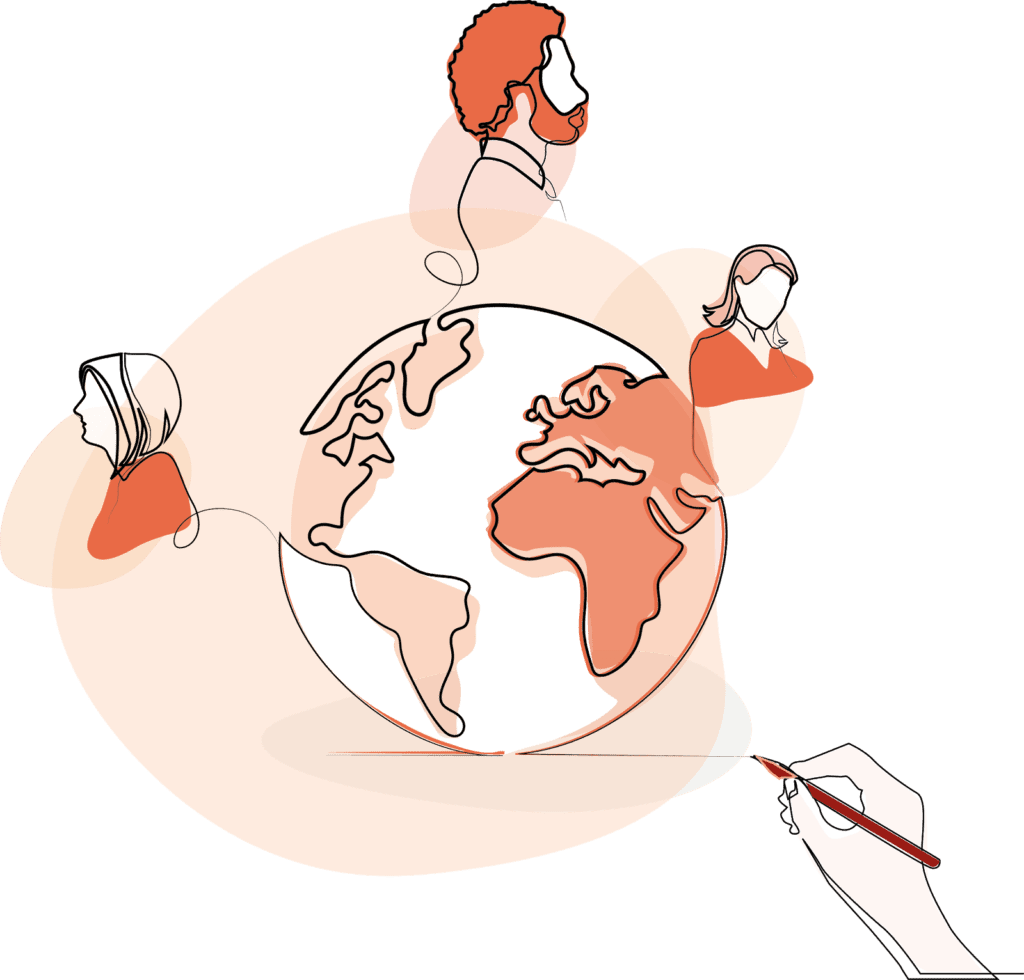
I think taking that step back and thinking about my journey to this point, I think being a product of a, an immigrant family in the US, and really, I think doing a lot because it was my upbringing, my parents telling me how important hard work and dedication and commitment was and getting an A was better than getting a B and going to a great university was better than going to sort of a second tier University.
And there was this hierarchy of what success actually looked like, in my household and in my life. And I think many people are raised with that type of ethos. And it obviously has so many wonderful things that come with it. But it does have a flip side to the coin, which is oftentimes you’re doing things for external praise, or the more classic definitions of success and achievement.
So it took me quite a long time, probably into my mid 30s or so, when I was a good 13-14 years into building my career and doing professional work, when I think I found the thing that feels much more authentically me. And I think success really stems from that at the end of the day.
Q: When we spoke about you becoming one of our founding members, you mentioned about having, or rather how you feel about living a portfolio of life, and how that is then reflected back between your personal life and your working life. Rather than it just being a career path. Would you mind talking a little bit more about this way of living and how it’s been for you?
A: Yeah, I think we all have so many different responsibilities in our lives, but also so many different passions. Like, again, going back to this education example, there was a time when the day looked like morning doing maths, and science and English and literature and language and art, and you had this full spectrum, and sports and everything in between.
Then as we get older, traditionally, we’ve gotten just narrower and narrower in terms of the types of things that we’re unable to do. Some of that is building depth and expertise in a single area. And so you have to rinse, repeat, and the law of 10,000 hours, but I feel that we’ve really lost somewhere along the way, that real breadth to our characters, our personalities – and frankly, I think what fuels us to be great at those things that we do dedicate a lot more time to.
So I found that I went through a period of great expansion as everyone did when they were very young, to becoming more narrowly focused on a given category. And then little by little, I think the last certainly five years, if not 10 years, started to bolt on more things – whether that’s new projects outside of work, or in my home life, my personal life.
I was alluding to this in that first conversation: we have three young startups at home! We have three young kids, we’re building a family ourselves, we’re building a new network for ourselves in London, where we moved five years ago, with new friendships and relationships.
And what I’ve realised is that in adding all those things into my life, instead of having less time for any one thing, I feel like my world has expanded hugely. And actually, I feel that they each make me so much better at the other thing that I’m doing. Each of them gives me energy in a different way.
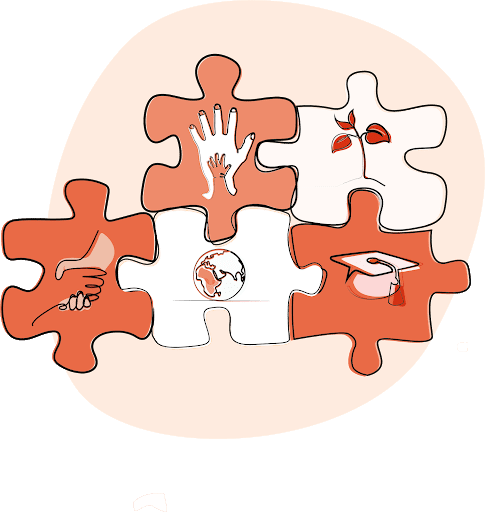
And therefore, you get this lovely, non zero sum phenomenon where you somehow get more energy, more capacity, more time, from doing things that are genuinely interesting to you in different ways.
Q: That’s an incredible way of describing it, because there are many pulls on your time. How do you approach that kind of balance? And how do you approach getting time for just you in all the things that you do? Is that possible, especially with being a parent as well?
A: So I’m particularly bad at that last one, so I won’t pretend to be good. I actually think that Coronavirus and the lockdown and everything has been particularly challenging for people on that front because somehow the separation for me of getting up putting on sort of professional work clothes, leaving the house, going to an office and then coming back, there was more of a separation between one and the other.
And also there was just more commute time / downtime in between, versus, if I can hear my family in the other room, when you and I get off of a podcast call I’m gonna shut my computer and immediately go there because there’s such a scarcity of time for anything that you love. You just try and pack the day as full as you can. So it’s taken me six months or so to settle into something that looks like it’s going to be a new, at least hybrid, way of working for quite a long time to come, and really understand the importance, as you say, have some time just for you.
So I’m trying to build those ends little by little, but I think it comes from this voracious appetite to be with the people I love and do the things that I love to do. So on that front, I can’t claim that I do a great job. But I think the way in which I think about balance is much more work/life integration, as opposed to work/life balance, which I think has come in a very physical manifestation over lockdown.
Many people that you talk to, I think, have seen a really enormous silver lining to that, that sort of time spent in one another’s company, and all those little moments. But I think I’ve probably never had balance in my life, so to speak, and balance, I think, inherently talks about some perfect equilibrium, which I think is an impossible standard.
But also, I think, as you think about balance you consider “there’s this troubling thing over here, it needs to be balanced by something that is positive” or you have a positive and negative and they tend to be kind of counterweights to each other. And yeah, that’s not how I see or aspire to live my life. And I think it’s figuring out a way of, as I said, getting energy from both things.
One of my partners in the firm has a word that he uses, which I reference a lot because it very much resonates with me – the word is around things being “generative”.
So if I come into a meeting with you, and we both bring a lot of our brain power, and our physical energy, mental energy, emotional energy, we can leave it all in the room and give it everything that we have.
Oftentimes, you’ll leave that room and you’ll actually have more energy than when you came in. Like you’ve just created something, you’ve generated something with that other person.
And then other times you’ll go in, and it can be a really basic meeting, you’re not actually bringing a huge amount of yourself and you can leave just feel like completely drained and depleted.
So I think figuring out for yourself, what is generative? What are those things that actually generate energy for you, and then using those sort of reserves, if you will be able to do all those other things that are required of you as an individual. That’s the way I try and think about balance.
Q: You mentioned that about your voracious appetite for new things for new work for, for creating. And certainly, your successes, as we’ve already discussed, are very much based on a foundation of a lot of hard work, you’ve obviously applied yourself to do the hard work and really create something whether that was studying at Yale, or then your MBA at Harvard, and all the businesses that you formed and supported along the way. And we touched briefly on your family being a touchstone on that, and certainly a driving force. But I wondered if you wanted to talk a bit more about how that mindset was created, and how it’s taken you from A to B and forwards?
A: So one of my companies that I helped start is a genetics/genomics company, and I’m a big believer in, in nature, as well as nurture. I think there are things that are hard coded into your DNA.
It’s quite interesting to watch the childhood videos of myself and my older sister. She’s three and a half years older than me, and at a gymnastics class that we’re in when I’m three, and she’s six, there’s this other kid in the class who does a somersault and you see my sister being like, “That’s awesome”, “Well done, you can do a somersault”, and then the camera pans over to me, and I’m like, “Oh, she thinks she could do a somersault. Like I’ll show you a somersault.” You see my little three year old self trying to compete with these six year olds, and you can see how my sister and I are just wired differently.
I think I always had a bit of that competitive spirit in me, very much around competition with myself and trying to always strive to be better and continuous improvement. And I think that was fueled by the fact that I grew up with my father from the age of 11. And my sister grew up with my mum, and she went back to university to get her graduate degree. So we were separated. My father is quite a hard driving competitive, A is better than B, kind of guy. So I think that also really shaped a lot of my early years of being really proud to do well and show him that I had done well.
I think there’s now, as I was talking about the first question, there’s a great internal intrinsic motivation and much more authenticity in myself to why I care about doing well and the things that I’m doing now and frankly, across everything that I do, I feel like it’s it’s really about others as opposed to being about me.
And that feels like a much better place. It feels like I’m doing things for reasons that are really important to me as opposed to somehow trying to get the award and then show it off to someone else. So it’s been a real journey to that. But I think a lot of it is nature and then a good dose of nurture in there as well.
Q: I see portfolio careers as an obvious choice for investors to get involved with, especially now, I’ve learned more about you and from you, what would you recommend to fellow investors considering a change, looking at whether they should be continuing in a normal nine to five? What kind of advice would you, would you give them when they’re looking at it thinking “What next?”
A: Yeah, I think it’s particularly suited, actually, to investors and in investment roles. And part of that is, I’m thinking about investing in a company, my hope is that that founder, that CEO, that team knows more about that company, that market insight, the dynamics that are very specific to what they’re operating in 24/7, than I will, but what I will know are things that they can’t see if they are in that narrow, very deep vein of being constantly focused around one thing, one problem they’re trying to solve.
And so I think part of the benefit of being an investor and having this meta level view across many different businesses, in many different segments, with many different customer bases and business models, is actually there’s far more connectivity to those dots than may initially meet the eye. And so breakthroughs in thought or opening up a window of opportunity for a founder is very much predicated on you being able to see things that they by definition don’t.
In my experience, that’s been a portfolio, literally is the word that we use to talk about our own investment portfolio. So looking at adjacencies, or commonalities across businesses that may seem very disparate or very separate.
But also in my personal life I was having this conversation with, we use an executive coach at Kindred at our venture fund. He works with us as individual Investment Partners, but also on the team dynamic. And he’s been an extraordinary asset to us.
I was having a conversation with him a couple of weeks ago. And he said, asking me about places in my life that I felt are very generative for me, and places where I felt like I had something really to add, where I was quite confident in my abilities. I spoke about being a mother. And I said, I’ve only been doing it for five years, our eldest child has special needs. And I am by no means an expert in disabilities or special needs. I haven’t read the psychology books around parenting. I’m not a psychologist, PhD by training. But I feel very confident in my sort of intuition and abilities as a mum. If there was another parent who wanted to speak to me about some issue they were struggling with, or they were trying to work through, I would be so excited to take that call and give them at least some of what I’ve learned along the way.
And we were trying to think about that mindset on how to take that mindset into the investment realm that I work in professionally, where you’re not the expert in the room, again, on that domain or on that technology, or you shouldn’t be otherwise you probably shouldn’t be investing in that CEO. But actually there are some areas where you have – you over-index, you’ve got great intuition, you’ve got great gut or judgement, you really back your understanding of something and you can bring those things to bear.
So again, throughout my life, personal/professional, I feel like there are these experiences that you can bring to bear as you think about supporting folks professionally from an investment perspective.
Listen to the whole conversation on Episode 5 of PorfolioCast:
Think this sounds like the right path for you? Come along to our monthly Community Welcome Call for new members to find out what a portfolio career could look like and how The Portfolio Collective can help you take those first steps towards professional success – and don’t forget to connect with our community!
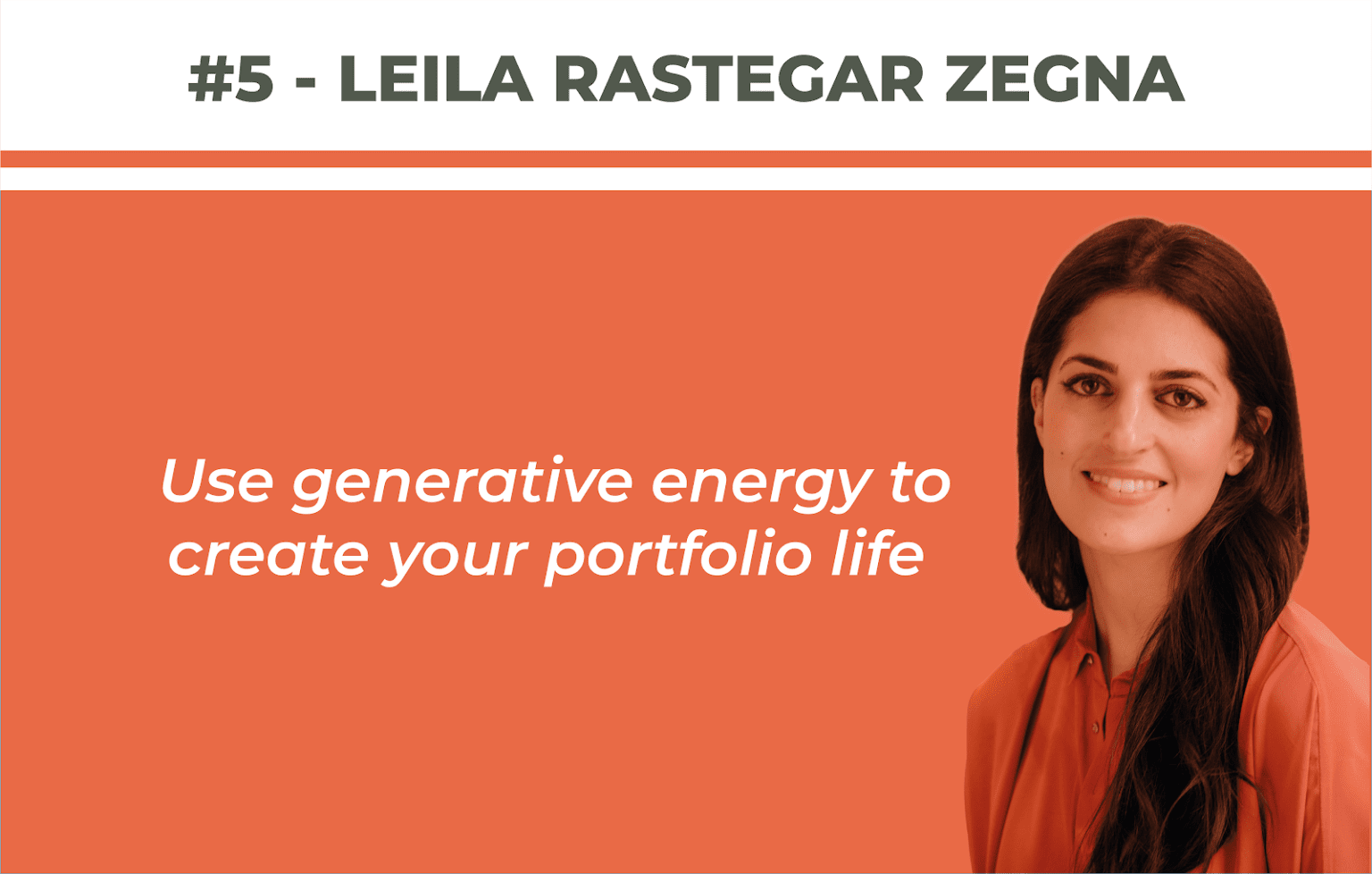
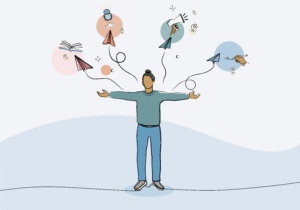

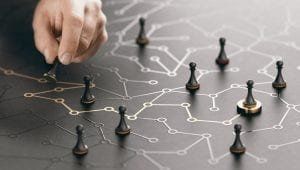
3 responses to “Portfolio Journey Series: Leila Rastegar Zegna”
Thanks @lexi-radcliffe-harttpc and Leila for this great article. I immeadiately started the podcast!
Excellent to hear @lbgrduin! Enjoy.
If you haven’t already heard this episode, or perhaps some of our others, it’s a great one to start on!